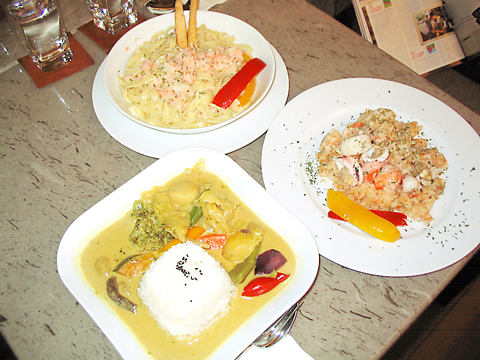Tucked away on a quiet residential side street just two blocks away from the Takishimaya Department Store and the Shilin Court House in Tianmu is a small oasis of tranquility called DC Cafe.
In fact, it is so well tucked away that most of the almost two-year-old cafe's business comes from friends telling friends about it. There are no big, garish letters on the outside, just a discreet sign and a short walkway that takes you past a little garden and pond, setting the stage for what's inside.
The cafe is three light-filled floors, outfitted with a few tables and comfortably upholstered chairs and decorated with Chinese antiques, including a lovely robe on one of the ground floor's walls.

PHOTO: DIANE BAKER, TAIPEI TIMES
The menu is similarly low-key, offering a mix of Western and Eastern dishes. There are seven "Combo Dining" meals, ranging from vegetable curry with rice, shrimp or pork dumplings and fettuccine with smoked salmon to India curry and chicken with rice. Each comes with a choice of either soup or a drink. A list of five specials includes roast cream rice with potato and shrimp, lasagna with beef and mushroom and spaghetti with seafood and Marseilles Soup.
There is a wide list of non-alcoholic beverages, including several coffee options, various hot and cold teas and fruit juices as well as a page of tempting desserts, such as apple pie, pumpkin cheese pie and baked banana or apple.
The meals range in price from NT$350 to NT$380, and the drinks and desserts from NT$130 to NT$200. The afternoon tea set costs between NT$360 and NT$390, depending on your choice of desert.
The pumpkin soup is a good way to start off the meal: Rich, creamy and lightly seasoned, the taste of the pumpkin is allowed to shine through. A clear favorite among cafe regulars is the fettuccine with smoked salmon. A piquant cream sauce lightly coats the noodles, which are garnished with abundant chunks of salmon. My two friends who ordered this cleaned their plates fairly quickly.
The vegetable curry is also recommended, although with the caveat that this is a Japanese-style curry. Personally I prefer a bit more bite, but obviously this dish is designed to curry favor with those whose tastebuds are not so bold.

Eric Finkelstein is a world record junkie. The American’s Guinness World Records include the largest flag mosaic made from table tennis balls, the longest table tennis serve and eating at the most Michelin-starred restaurants in 24 hours in New York. Many would probably share the opinion of Finkelstein’s sister when talking about his records: “You’re a lunatic.” But that’s not stopping him from his next big feat, and this time he is teaming up with his wife, Taiwanese native Jackie Cheng (鄭佳祺): visit and purchase a

April 7 to April 13 After spending over two years with the Republic of China (ROC) Army, A-Mei (阿美) boarded a ship in April 1947 bound for Taiwan. But instead of walking on board with his comrades, his roughly 5-tonne body was lifted using a cargo net. He wasn’t the only elephant; A-Lan (阿蘭) and A-Pei (阿沛) were also on board. The trio had been through hell since they’d been captured by the Japanese Army in Myanmar to transport supplies during World War II. The pachyderms were seized by the ROC New 1st Army’s 30th Division in January 1945, serving

The People’s Republic of China (PRC) last week offered us a glimpse of the violence it plans against Taiwan, with two days of blockade drills conducted around the nation and live-fire exercises not far away in the East China Sea. The PRC said it had practiced hitting “simulated targets of key ports and energy facilities.” Taiwan confirmed on Thursday that PRC Coast Guard ships were directed by the its Eastern Theater Command, meaning that they are assumed to be military assets in a confrontation. Because of this, the number of assets available to the PRC navy is far, far bigger

The 1990s were a turbulent time for the Chinese Nationalist Party’s (KMT) patronage factions. For a look at how they formed, check out the March 2 “Deep Dives.” In the boom years of the 1980s and 1990s the factions amassed fortunes from corruption, access to the levers of local government and prime access to property. They also moved into industries like construction and the gravel business, devastating river ecosystems while the governments they controlled looked the other way. By this period, the factions had largely carved out geographical feifdoms in the local jurisdictions the national KMT restrained them to. For example,